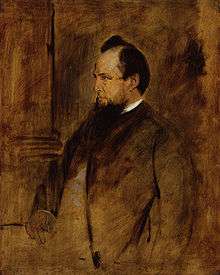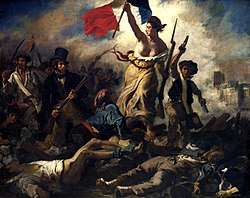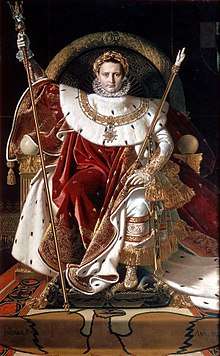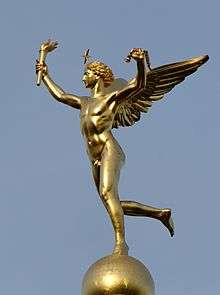John Emerich Edward Dalberg Acton, 1st Baron Acton (10 January 1834 – 19 June 1902) was an English historian, commonly known as Lord Acton.
Quotes
There is no worse heresy than that the office sanctifies the holder of it.
- There are two things which cannot be attacked in front: ignorance and narrow-mindedness. They can only be shaken by the simple development of the contrary qualities. They will not bear discussion.
- Letter (23 January 1861), published in Lord Acton and his Circle (1906) by Abbot Francis Aidan Gasquet, Letter 74
- Every thing secret degenerates, even the administration of justice; nothing is safe that does not show how it can bear discussion and publicity.
- Letter (23 January 1861), published in Lord Acton and his Circle (1906) by Abbot Gasquet, Letter 74
- Without presuming to decide the purely legal question, on which it seems evident to me from Madison's and Hamilton's papers that the Fathers of the Constitution were not agreed, I saw in State Rights the only availing check upon the absolutism of the sovereign will, and secession filled me with hope, not as the destruction but as the redemption of Democracy. The institutions of your Republic have not exercised on the old world the salutary and liberating influence which ought to have belonged to them, by reason of those defects and abuses of principle which the Confederate Constitution was expressly and wisely calculated to remedy. I believed that the example of that great Reform would have blessed all the races of mankind by establishing true freedom purged of the native dangers and disorders of Republics. Therefore I deemed that you were fighting the battles of our liberty, our progress, and our civilization; and I mourn for the stake which was lost at Richmond more deeply than I rejoice over that which was saved at Waterloo.
- The sentiment on which [papal] infallibility was founded could not be reached by argument, the weapon of human reason, but resided in conclusions transcending evidence, and was the inaccessible postulate rather than a demonstrable consequence of a system of religious faith.
- "The Vatican Council," The North British Review (1870)
- To proclaim the Pope infallible was their compendious security against hostile States and Churches, against human liberty and authority, against disintegrating tolerance and rationalizing science, against error and sin.
- "The Vatican Council," The North British Review (1870)
- I cannot accept your canon that we are to judge Pope and King unlike other men, with a favorable presumption that they did no wrong. If there is any presumption it is the other way against holders of power, increasing as the power increases. Historic responsibility has to make up for the want of legal responsibility. Power tends to corrupt and absolute power corrupts absolutely. Great men are almost always bad men, even when they exercise influence and not authority: still more when you superadd the tendency or the certainty of corruption by authority. There is no worse heresy than that the office sanctifies the holder of it. That is the point at which the negation of Catholicism and the negation of Liberalism meet and keep high festival, and the end learns to justify the means.
- Letter to Mandell Creighton (5 April 1887), published in Historical Essays and Studies, by John Emerich Edward Dalberg-Acton (1907), edited by John Neville Figgis and Reginald Vere Laurence, Appendix, p. 504; also in Essays on Freedom and Power (1972)
- Paraphrased variant: All power tends to corrupt and absolute power corrupts absolutely.
- The inflexible integrity of the moral code is, to me, the secret of the authority, the dignity, the utility of History.
If we may debase the currency for the sake of genius, or success, or rank, or reputation, we may debase it for the sake of a man’s influence, of his religion, of his party, of the good cause which prospers by his credit and suffers by his disgrace. Then History ceases to be a science, an arbiter of controversy, a guide of the Wanderer, the upholder of that moral standard which the powers of earth and religion itself tend constantly to depress. It serves where it ought to reign; and it serves the worst cause better than the purest.- Letter to Mandell Creighton (5 April 1887), published in Historical Essays and Studies, by John Emerich Edward Dalberg-Acton (1907), edited by John Neville Figgis and Reginald Vere Laurence, Appendix, p. 504; also in Essays on Freedom and Power (1972)
- ADVICE TO PERSONS ABOUT TO WRITE HISTORY — DON’T
In the Moral Sciences Prejudice is Dishonesty.
A Historian has to fight against temptations special to his mode of life, temptations from Country, Class, Church, College, Party, Authority of talents, solicitation of friends.
The most respectable of these influences are the most dangerous.
The historian who neglects to root them out is exactly like a juror who votes according to his personal likes or dislikes.
In judging men and things Ethics go before Dogma, Politics or Nationality. The Ethics of History cannot be denominational.
Judge not according to the orthodox standard of a system religious, philosophical, political, but according as things promote, or fail to promote the delicacy, integrity, and authority of Conscience.
Put conscience above both system and success.
History provides neither compensation for suffering nor penalties for wrong.- Postscript of letter to Mandell Creighton (5 April 1887), puplished in Historical Essays and Studies, by John Emerich Edward Dalberg-Acton (1907), edited by John Neville Figgis and Reginald Vere Laurence, Appendix, p. 505
- The immediate purpose with which the Italians and Germans effected the great change in European constitution was unity, not liberty. They constructed, not securities, but forces. Machiavelli's hour had come.
- Introductory note to G.P. Gooch's Annals of Politics and Culture, p. xxxlv (1901)
- History is not a web woven with innocent hands. Among all the causes which degrade and demoralize men, power is the most constant and the most active.
- Liberty becomes a question of morals more that politics.
- Selected Writings of Lord Acton, ed. J. Rufus Fears, 3 vols. (Indianapolis: Liberty Fund, 1985-88), 3:490
- Authority that does not exist for Liberty is not authority but force.
- Selected Writings of Lord Acton, ed. J. Rufus Fears, 3 vols. (Indianapolis: Liberty Fund, 1985-88), 3:519
- Liberty is the prevention of control by others. This requires self-control and, therefore, religious and spiritual influences; education, knowledge, well-being.
- As quoted in Faith in Freedom : Libertarian Principles and Psychiatric Practices (2004) by Thomas Stephen Szasz, p. 10. Selected Writings of Lord Acton, ed. J. Rufus Fears, 3 vols. (Indianapolis: Liberty Fund, 1985-88), 3:490
"Nationality" (1862)
- Patriotism is in political life what faith is in religion, and it stands to the domestic feelings and to home-sickness as faith to fanaticism and to superstition.
- The man who prefers his country before every other duty shows the same spirit as the man who surrenders every right to the State. They both deny that right is superior to authority.
- A State which is incompetent to satisfy different races condemns itself; a State which labours to neutralise, to absorb, or to expel them, destroys its own vitality; a State which does not include them is destitute of the chief basis of self-government. The theory of nationality, therefore, is a retrograde step in history.
- Whenever a single definite object is made the supreme end of the State, be it the advantage of a class, the safety of the power of the country, the greatest happiness of the greatest number, or the support of any speculative idea, the State becomes for the time inevitably absolute. Liberty alone demands for its realisation the limitation of the public authority, for liberty is the only object which benefits all alike, and provokes no sincere opposition.
- Although, therefore, the theory of nationality is more absurd and more criminal than the theory of socialism, it has an important mission in the world, and marks the final conflict, and therefore the end, of two forces which are the worst enemies of civil freedom, — the absolute monarchy and the revolution.
The History of Freedom in Antiquity (1877)
- The History of Freedom in Antiquity (28 February 1877) · The History Of Freedom and Other Essays (1907) printing
At all times sincere friends of freedom have been rare, and its triumphs have been due to minorities, that have prevailed by associating themselves with auxiliaries whose objects often differed from their own…
- Liberty, next to religion has been the motive of good deeds and the common pretext of crime, from the sowing of the seed at Athens, two thousand four hundred and sixty years ago, until the ripened harvest was gathered by men of our race.
- Opening statement.
- In every age its [liberty's] progress has been beset by its natural enemies, by ignorance and superstition, by lust of conquest and by love of ease, by the strong man's craving for power, and the poor man's craving for food.
- At all times sincere friends of freedom have been rare, and its triumphs have been due to minorities, that have prevailed by associating themselves with auxiliaries whose objects often differed from their own; and this association, which is always dangerous, has been sometimes disastrous, by giving to opponents just grounds of opposition, and by kindling dispute over the spoils in the hour of success.
- No obstacle has been so constant, or so difficult to overcome, as uncertainty and confusion touching the nature of true liberty. If hostile interests have wrought much injury, false ideas have wrought still more; and its advance is recorded in the increase of knowledge, as much as in the improvement of laws.
- The history of institutions is often a history of deception and illusions; for their virtue depends on the ideas that produce and on the spirit that preserves them, and the form may remain unaltered when the substance has passed away.
- According to the common opinion indirect elections are a safeguard of conservatism. But all the Assemblies of the French Revolution issued from indirect elections.
- Legally and to outward seeming the American President is the successor of Washington, and still enjoys powers devised and limited by the Convention of Philadelphia. In reality the new President differs from the Magistrate imagined by the Fathers of the Republic as widely as Monarchy from Democracy...
- [W]e are not so much concerned this evening with the dead letter of edicts and of statutes as with the living thoughts of men.
- A century ago it was perfectly well known that whoever had one audience of a Master in Chancery was made to pay for three, but no man heeded the enormity until it suggested to a young lawyer that it might be well to question and examine with rigorous suspicion every part of a system in which such things were done. The day on which that gleam lighted up the clear hard mind of Jeremy Bentham is memorable in the political calendar beyond the entire administration of many statesmen.
- It would be easy to point out a paragraph in St. Augustine, or a sentence of Grotius that outweighs in influence the Acts of fifty Parliaments, and our cause owes more to Cicero and Seneca, to Vinet and Tocqueville, than to the laws of Lycurgus or the Five Codes of France.
- By liberty I mean the assurance that every man shall be protected in doing what he believes his duty against the influence of authority and majorities, custom and opinion.
- The State is competent to assign duties and draw the line between good and evil only in its immediate sphere. Beyond the limits of things necessary for its well-being, it can only give indirect help to fight the battle of life by promoting the influences which prevail against temptation, — religion, education, and the distribution of wealth.
- In ancient times the State absorbed authorities not its own, and intruded on the domain of personal freedom. In the Middle Ages it possessed too little authority, and suffered others to intrude. Modern States fall habitually into both excesses. The most certain test by which we judge whether a country is really free is the amount of security enjoyed by minorities. Liberty, by this definition, is the essential condition and guardian of religion...
- The government of the Israelites was a Federation, held together by no political authority, but by the unity of... faith and founded not on physical force but on a voluntary covenant. The principle of self-government was carried out not only in each tribe, but in every group of at least 120 families; and there was neither privilege of rank nor inequality before the law. Monarchy was so alien to the primitive spirit of the community that it was resisted by Samuel... The throne was erected on a compact; and the king was deprived of the right of legislation among a people that recognised no lawgiver but God, whose highest aim in politics was to... make its government conform to the ideal type that was hallowed by the sanctions of heaven. The inspired men who rose in unfailing succession to prophesy against the usurper and the tyrant, constantly proclaimed that the laws, which were divine, were paramount over sinful rulers, and appealed... to the healing forces that slept in the uncorrupted consciences of the masses. Thus the... Hebrew nation laid down the parallel lines on which all freedom has been won—the doctrine of national tradition and the doctrine of the higher law; the principle that a constitution grows from a root, by process of development... and the principle that all political authorities must be tested and reformed according to a code which was not made by man. The operation of these principles... occupies the whole of the space we are going over together.
- The conflict between liberty under divine authority and the absolutism of human authorities ended disastrously. ...In the very year 586 [BCE], in which the flood of Asiatic despotism closed over the city which had been, and was destined again to be, the sanctuary of freedom in the East, a new home was prepared for it in the West, where, guarded by the sea and the mountains, and by valiant hearts, that stately plant was reared under whose shade we dwell, and which is extending its invincible arms so slowly and yet so surely over the civilised world.
- [L]liberty is ancient, and it is despotism that is new. ...The heroic age of Greece confirms it, and it is still more conspicuously true of Teutonic Europe. ...They exhibit some sense of common interest in common concerns, little reverence for external authority, and an imperfect sense of the function and supremacy of the State. Where the division of property and labour is incomplete there is little division of classes and of power. Until societies are tried by the complex problems of civilisation they may escape despotism, as societies that are undisturbed by religious diversity avoid persecution.
- Six hundred years before the birth of Christ absolutism held unbounded sway. Throughout the East it was propped by the unchanging influence of priests and armies. In the West, where there were no sacred books requiring trained interpreters, the priesthood acquired no preponderance, and when the kings were overthrown their powers passed to aristocracies of birth.
- What followed, during many generations, was the cruel domination of class over class, the oppression of the poor by the rich, and of the ignorant by the wise. The spirit of that domination found passionate utterance in the verses of the aristocratic poet Theognis,... who longed to drink the blood of his political adversaries. From these oppressors the people of many cities sought deliverance in the less intolerable tyranny of revolutionary usurpers. The remedy gave new shape and energy to the evil. ...rights secured by equal laws and by sharing power existed nowhere.
- From this universal degradation the world was rescued by the most gifted of the nations. Athens, which like other cities was distracted and oppressed by a privileged class, avoided violence and appointed Solon to revise its laws. ...Solon gave a share of power proportioned to the demands made on their resources. The poorest classes were exempt from direct taxes, but were excluded from office. Solon gave them a voice in electing magistrates from the classes above them, and the right of calling them to account. This concession... was the beginning of a mighty change. It introduced the idea that a man ought to have a voice in selecting those to whose rectitude and wisdom he is compelled to trust his fortune, his family, and his life. And this idea completely inverted the notion of human authority, for it inaugurated the reign of moral influence... Government by consent superseded government by compulsion, and the pyramid which had stood on a point was made to stand upon its base. By making every citizen the guardian of his own interest Solon admitted the element of Democracy into the State.
- Their [Athenians] history furnishes the classic example of the peril of Democracy under conditions singularly favourable. For the Athenians were not only brave and patriotic and capable of generous sacrifice, but they were the most religious of the Greeks. They venerated the constitution which had given them prosperity and equality and the pride of freedom...They tolerated considerable variety of opinion, and great license of speech...Thus they became the only people of antiquity that grew great by democratic institutions. But the possession of unlimited power, which corrodes the conscience, hardens the heart, and confounds the understanding of monarchs exercised its demoralizing influence on the illustrious Democracy of Athens.
- It is bad to be oppressed by a minority, but it is worse to be oppressed by a majority. For there is a reserve of latent power in the masses which, if it is called into play, the minority can seldom resist. But from the absolute will of an entire people there is no appeal, no redemption, no refuge but treason.
- Liberty and good government do not exclude each other; and there are excellent reasons why they should go together. Liberty is not a means to a higher political end. It is itself the highest political end. It is not for the sake of a good public administration that it is required, but for security in the pursuit of the highest objects of civil society, and of private life.
- Increase of freedom in the state may sometimes promote mediocrity, and give vitality to prejudice; it may even retard useful legislation, diminish the capacity for war, and restrict the boundaries of Empire...A generous spirit prefers that his country should be poor, and weak, and of no account, but free, rather than powerful, prosperous, and enslaved. It is better to be the citizen of a humble commonwealth in the Alps, without a prospect of influence beyond the narrow frontier, than a subject of a superb autocracy that overshadows half of Asia and of Europe.
- But it may be urged, on the other side, that Liberty is not the sum or substitute for of all things men ought to live for... to be real it must be circumscribed... advancing civilisation invests the state with increased rights and duties, and imposes increased burdens and constraints on the subject... a highly instructed and intelligent community may perceive the benefit of compulsory obligations which, at a lower stage, would be thought unbearable... liberal progress is not vague or indefinite, but aims at a point where the public is subject to no restrictions but those of which it feels the advantage... a free country may be less capable of doing much for the advancement of religion, the prevention of vice, or the relief of suffering, than one that does not shrink from confronting great emergencies by some sacrifice of individual rights, and some concentration of power... the supreme political object ought to be sometimes postponed to still higher moral objects. My argument involves no collision with these qualifying reflections. We are dealing, not with the effects of freedom, but with its causes. ...influences which brought arbitrary government under control, either by the diffusion of power, or to an appeal to an authority which transcends all government, and among these influences the greatest philosophers of Greece have no claim to be reckoned.
- The great question is, to discover not what governments prescribe, but what they ought to prescribe; for no prescription is valid against the conscience of mankind.
- Before God, there is neither Greek nor barbarian, neither rich nor poor; and the slave is as good as his master, for by birth all men are free; they are citizens of that universal commonwealth which embraces all the world, brethren of one family, and children of God.
- The Stoics could only advise the wise man to hold aloof from politics, keeping the unwritten law in his heart. But when Christ said: "Render unto Cæsar the things that are Cæsar's, and unto God the things that are God's," those words, spoken on His last visit to the Temple, three days before His death, gave to the civil power, under the protection of conscience, a sacredness it had never enjoyed, and bounds it had never acknowledged; and they were the repudiation of absolutism and the inauguration of freedom.
The History of Freedom in Christianity (1877)

Constantine declared his own will equivalent to a canon of the Church … the empire employed its refined civilization …to make the Church serve as a gilded crutch of absolutism.
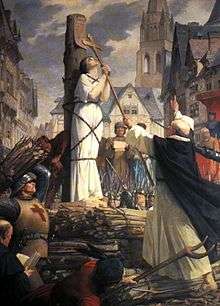
Christianity, which in earlier times had addressed itself to the masses, and relied on the principle of liberty, now made its appeal to the rulers, and threw its mighty influence into the scale of authority.
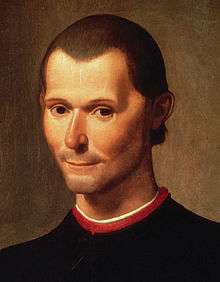
Machiavelli's teaching would hardly have stood the test of parliamentary government, for public discussion demands at least the profession of good faith.
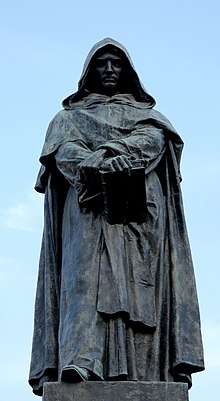
Atrocious deeds were done, in which religious passion was often the instrument, but policy was the motive. Fanaticism displays itself in the masses; but the masses were rarely fanaticised; and the crimes ascribed to it were commonly due to the calculations of dispassionate politicians.
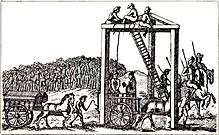
Tyburn tree may be a useful thing; but it is better still that the offender should live for repentance and reformation. The principles which discriminate in politics between good and evil, and make states worthy to last, were not yet found.
- Constantine declared his own will equivalent to a canon of the Church. According to Justinian, the Roman people had formally transferred to the emperors the entire plenitude of its authority, and, therefore, the emperor’s pleasure, expressed by edict or by letter, had force of law. Even in the fervent age of its conversion the empire employed its refined civilization, the accumulated wisdom of ancient sages, the reasonableness and subtlety of Roman law, and the entire inheritance of the Jewish, the pagan, and the Christian world, to make the Church serve as a gilded crutch of absolutism. Neither an enlightened philosophy, nor all the political wisdom of Rome, nor even the faith and virtue of the Christians availed against the incorrigible tradition of antiquity. Something was wanted, beyond all the gifts of reflection and experience — a faculty of self government and self control, developed like its language in the fibre of a nation, and growing with its growth. This vital element, which many centuries of warfare, of anarchy, of oppression, had extinguished in the countries that were still draped in the pomp of ancient civilization, was deposited on the soil of Christendom by the fertilising stream of migration that overthrew the empire of the West.
- In the height of their power the Romans became aware of a race of men that had not abdicated freedom in the hands of a monarch; and the ablest writer of the empire pointed to them with a vague and bitter feeling that, to the institutions of these barbarians, not yet crushed by despotism, the future of the world belonged. Their kings, when they had kings, did not preside [at] their councils; they were sometimes elective; they were sometimes deposed; and they were bound by oath to act in obedience to the general wish. They enjoyed real authority only in war. This primitive Republicanism, which admits monarchy as an occasional incident, but holds fast to the collective supremacy of all free men, of the constituent authority over all constituted authorities, is the remote germ of parliamentary government.
- The idea that the ends of government justify the means employed, was worked into system by Machiavelli. He was an acute politician, sincerely anxious that the obstacles to the intelligent government of Italy should be swept away. It appeared to him that the most vexatious obstacle to intellect is conscience, and that the vigorous use of statecraft necessary for the success of difficult schemes would never be made if governments allowed themselves to be hampered by the precepts of the copy-book.
His audacious doctrine was avowed in the succeeding age, by men whose personal character otherwise stood high. They saw that in critical times good men have seldom strength for their goodness, and yield to those who have grasped the meaning of the maxim that you cannot make an omelette if you are afraid to break the eggs. They saw that public morality differs from private, because no government can turn the other cheek, or can admit that mercy is better than justice. And they could not define the difference, or draw the limits of exception; or tell what other standard for a nation’s acts there is than the judgment which heaven pronounces in this world by success.
- Machiavelli's teaching would hardly have stood the test of parliamentary government, for public discussion demands at least the profession of good faith. But it gave an immense impulse to absolutism by silencing the consciences of very religious kings, and made the good and the bad very much alike.
- The way was paved for absolute monarchy to triumph over the spirit and institutions of a better age, not by isolated acts of wickedness, but by a studied philosophy of crime, and so thorough a perversion of the moral sense that the like of it had not been since the Stoics reformed the morality of paganism.
The clergy who had in so many ways served the cause of freedom during the prolonged strife against feudalism and slavery, were associated now with the interest of royalty.
- The tide was running fast when the Reformation began at Wittenberg, and it was to be expected that Luther’s influence would stem the flood of absolutism. For he was confronted everywhere by the compact alliance of the Church with the State; and great part of his country was governed by hostile potentates who were prelates of the court of Rome. He had, indeed, more to fear from temporal than from spiritual foes.
- Nations eagerly invested their rulers with every prerogative needed to preserve their faith, and all the care to keep Church and State asunder, and to prevent the confusion of their powers, which had been the work of ages, was renounced in the intensity of the crisis. Atrocious deeds were done, in which religious passion was often the instrument, but policy was the motive.
Fanaticism displays itself in the masses; but the masses were rarely fanaticised; and the crimes ascribed to it were commonly due to the calculations of dispassionate politicians.
- John Knox thought that every Catholic in Scotland ought to be put to death; and no man ever had disciples of a sterner or more relentless temper. But his counsel was not followed.
All through the religious conflict, policy kept the upper hand. When the last of the Reformers died, religion, instead of emancipating the nations, had become an excuse for the criminal art of despots. Calvin preached, and Bellarmine lectured; but Machiavelli reigned.
- That men should understand that governments do not exist by divine right, and that arbitrary government is the violation of divine right, was no doubt the medicine suited to the malady under which Europe languished. But although the knowledge of this truth might become an element of salutary destruction, it could give little aid to progress and reform. Resistance to tyranny implied no faculty of constructing a legal government in its place. Tyburn tree may be a useful thing; but it is better still that the offender should live for repentance and reformation. The principles which discriminate in politics between good and evil, and make states worthy to last, were not yet found.
- The French philosopher Charron was one of the men least demoralised by party spirit, and least blinded by zeal for a cause. In a passage almost literally taken from St. Thomas, he describes our subordination under the law of nature, to which all legislation must conform; and he ascertains it not by the light of revealed religion, but by the voice of universal reason, through which God enlightens the consciences of men. Upon this foundation Grotius drew the lines of real political science. In gathering the materials of International law, he had to go beyond national treaties and denominational interests, for a principle embracing all mankind. The principles of law must stand, he said, even if we suppose that there is no God. By these inaccurate terms he meant that they must be found independently of Revelation. From that time it became possible to make politics a matter of principle and of conscience, so that men and nations differing in all other things could live in peace together, under the sanctions of a common law.
- It was manifest that all persons who had learned that political science is an affair of conscience rather than of might or expediency, must regard their adversaries as men without principle, that the controversy between them would perpetually involve morality, and could not be governed by the plea of good intentions which softens down the asperities of religious strife. Nearly all the greatest men of the seventeenth century repudiated the innovation. In the eighteenth, the two ideas of Grotius, that there are certain political truths by which every state and every interest must stand or fall, and that society is knit together by a series of real and hypothetical contracts, became, in other hands, the lever that displaced the world. When, by what seemed the operation of an irresistible and constant law, royalty had prevailed over all enemies and all competitors, it became a religion. Its ancient rivals, the baron and the prelate, figured as supporters by its side.
- I have shown you how Machiavelli supplied the immoral theory needful for the consummation of royal absolutism; the absolute oligarchy of Venice required the same assurance against the revolt of conscience. It was provided by a writer as able as Machiavelli, who analyzed the wants and resources of aristocracy, and made known that its best security is poison.
- At that time there was some truth in the old joke which describes the English dislike of speculation by saying that all our philosophy consists of a short catechism in two questions: “What is mind? No matter. — What is matter? Never mind.” The only accepted appeal was to tradition.
- The idea that religious liberty is the generating principle of civil, and that civil liberty is the necessary condition of religious, was a discovery reserved for the seventeenth century.
- I have reached the end of my time, and have hardly come to the beginning of my task. In the ages of which I have spoken, the history of freedom was the history of the thing that was not. But since the Declaration of Independence, or, to speak more justly, since the Spaniards, deprived of their king, made a new government for themselves, the only known forms of Liberty, Republics and Constitutional Monarchy, have made their way over the world.
- I have fixed my eyes on the spaces that heaven’s light illuminates, that I may not lay too heavy a strain on the indulgence with which you have accompanied me over the dreary and heartbreaking course by which men have passed to freedom; and because the light that has guided us is still unquenched, and the causes that have carried us so far in the van of free nations have not spent their power; because the story of the future is written in the past, and that which hath been is the same thing that shall be.
Review of Democracy in Europe (1878)
- Acton's review of Democracy in Europe (1877) by Sir Thomas Erskine May, in The Quarterly Review (January 1878), p. 74; also in The History of Freedom and Other Essays, Section III: Sir Erskine May's Democracy in Europe, p. 76
- The manifest, the avowed difficulty is that democracy, no less than monarchy or aristocracy, sacrifices everything to maintain itself, and strives, with an energy and a plausibility that kings and nobles cannot attain, to override representation, to annul all the forces of resistance and deviation, and to secure, by Plebiscite, Referendum, or Caucus, free play for the will of the majority. The true democratic principle, that none shall have power over the people, is taken to mean that none shall be able to restrain or to elude its power. The true democratic principle, that the people shall not be made to do what it does not like, is taken to mean that it shall never be required to tolerate what it does not like. The true democratic principle, that every man‘s free will shall be as unfettered as possible, is taken to mean that the free will of the collective people shall be fettered in nothing. Religious toleration, judicial independence, dread of centralisation, jealousy of State interference, become obstacles to freedom instead of safeguards, when the centralised force of the State is wielded by the hands of the people. Democracy claims to be not only supreme, without authority above, but absolute, without independence below; to be its own master, not a trustee. The old sovereigns of the world are exchanged for a new one, who may be flattered and deceived, but whom it is impossible to corrupt or to resist, and to whom must be rendered the things that are Caesar's and also the things that are God’s. The enemy to be overcome is no longer the absolutism of the State, but the liberty of the subject. Nothing is more significant than the relish with which Ferrari, the most powerful democratic writer since Rousseau, enumerates the merits of tyrants, and prefers devils to saints in the interest of the community.
For the old notions of civil liberty and of social order did not benefit the masses of the people. Wealth increased, without relieving their wants. The progress of knowledge left them in abject ignorance. Religion flourished, but failed to reach them. Society, whose laws were made by the upper class alone, announced that the best thing for the poor is not to be born, and the next best to die in childhood, and suffered them to live in misery and crime and pain. As surely as the long reign of the rich has been employed in promoting the accumulation of wealth, the advent of the poor to power will be followed by schemes for diffusing it. Seeing how little was done by the wisdom of former times for education and public health, for insurance, association, and savings, for the protection of labour against the law of self-interest, and how much has been accomplished in this generation, there is reason in the fixed belief that a great change was needed, and that democracy has not striven in vain. Liberty, for the mass, is not happiness; and institutions are not an end but a means. The thing they seek is a force sufficient to sweep away scruples and the obstacle of rival interests, and, in some degree, to better their condition. They mean that the strong hand that heretofore has formed great States, protected religions, and defended the independence of nations, shall help them by preserving life, and endowing it for them with some, at least, of the things men live for. That is the notorious danger of modern democracy. That is also its purpose and its strength. And against this threatening power the weapons that struck down other despots do not avail. The greatest happiness principle positively confirms it. The principle of equality, besides being as easily applied to property as to power, opposes the existence of persons or groups of persons exempt from the common law, and independent of the common will; and the principle, that authority is a matter of contract, may hold good against kings, but not against the sovereign people, because a contract implies two parties.
- The one pervading evil of democracy is the tyranny of the majority, or rather of that party, not always the majority, that succeeds, by force or fraud, in carrying elections. To break off that point is to avert the danger. The common system of representation perpetuates the danger. Unequal electorates afford no security to majorities. Equal electorates give none to minorities. Thirty-five years ago it was pointed out that the remedy is proportional representation. It is profoundly democratic, for it increases the influence of thousands who would otherwise have no voice in the government; and it brings men more near an equality by so contriving that no vote shall be wasted, and that every voter shall contribute to bring into Parliament a member of his own opinions.
Letter to Mary Gladstone (1881)
Letter to Mary Gladstone (24 April 1881); later published in Letters of Lord Acton to Mary Gladstone (1913) p. 73
- We are forced, in equity, to share the government with the working class...If there is a free contract, in open market, between capital and labour, it cannot be right that one of the two contracting parties should have the making of the laws, the management of the conditions, the keeping of the peace, the administration of justice, the distribution of taxes, the control of expenditure, in its own hands exclusively. It is unjust that all these securities, all these advantages, should be on the same side...Before this argument the ancient dogma, that power attends on property, broke down. Justice required that property should-not abdicate, but-share its political supremacy.
- There is no error so monstrous that it fails to find defenders among the ablest men. Imagine a congress of eminent celebrities, such as More, Bacon, Grotius, Pascal, Cromwell, Bossuet, Montesquieu, Jefferson, Napoleon, Pitt, etc. The result would be an Encyclopedia of Error.
- The danger is not that a particular class is unfit to govern. Every class is unfit to govern. The law of liberty tends to abolish the reign of race over race, of faith over faith, of class over class.
- The law of liberty tends to abolish the reign of race over race, of faith over faith, of class over class. It is not the realisation of a political ideal: it is the discharge of a moral obligation.
- Almost all that has been done for the good of the people has been done since the right lost the monopoly of power, since the rights of property were discovered to be not unlimited.
The Study of History (1895)
- Inaugural lecture on The Study of History (11 June 1895), included in Lectures on Modern History (1906) - PDF file at Google
- I am not thinking of those shining precepts which are the registered property of every school; that is to say — learn as much by writing as by reading; be not content with the best book; seek sidelights from the others; have no favourites; keep men and things apart; guard against the prestige of great names; see that your judgments are your own; and do not shrink from disagreement; no trusting without testing; be more severe to ideas than to actions; do not overlook the strength of the bad cause of the weakness of the good; never be surprised by the crumbling of an idol or the disclosure of a skeleton; judge talent at its best and character at its worst; suspect power more than vice, and study problems in preference to periods.
- Many of these precepts which he quotes here have been quoted as originating with Lord Acton.
- Most of this, I suppose, is undisputed, and calls for no enlargement. But the weight of opinion is against me when I exhort you never to debase the moral currency or to lower the standard of rectitude, but to try others by the final maxim that governs your own lives, and to suffer no man and no cause to escape the undying penalty which history has the power to inflict on wrong. The plea in extenuation of guilt and mitigation of punishment is perpetual. At every step we are met by arguments which go to excuse, to palliate, to confound right and wrong, and reduce the just man to the level of the reprobate. The men who plot to baffle and resist us are, first of all, those who made history what it has become. They set up the principle that only a foolish Conservative judges the present time with the ideas of the past; that only a foolish Liberal judges the past with the ideas of the present.
- Praise is the shipwreck of historians.
- It is they [men of science] who hold the secret of the mysterious property of the mind by which error ministers to truth, and truth slowly but irrevocably prevails. Theirs is the logic of discovery, the demonstration of the advance of knowledge and the development of ideas, which, as the earthly wants and the passions of men remain almost unchanged, are the charter of progress, and the vital spark of history.
Misattributed
- Opinions alter, manners change, creeds rise and fall, but the moral laws are written on the tablets of eternity.
- James Anthony Froude, in the lecture "The Science of History" (5 February 1864); published in Representative Essays (1885) by George Haven Putnam, p. 274; Lord Acton quoted Froude in an address "The Study of History" (11 June 1895), which led to this being widely attributed to him. The phrase has also sometimes been misquoted as: Opinions alter, manners change, creeds rise and fall, but the moral laws are written on the table of eternity.
- The issue which has swept down the centuries and which will have to be fought sooner or later is the people versus the banks.
- As quoted in Maxed Out : Hard Times, Easy Credit, and the Era of Predatory Lenders (2007) by James D. Scurlock; The quote does not appear in any of Acton's published writings. Ezra Pound attributes the exact quotation to Sir Alexander James Cockburn, Lord Chief Justice of England in Pound, Ezra. "'Ezra Pound Speaking': Radio Speeches of World War II", ed. Leonard W. Doob (Westport: Greenwood Press, 1978), 219. https://archive.org/stream/EzraPoundSpeaking-RadioSpeechesOfWorldWarIi/EzraPoundSpeaking#page/n116/mode/1up/search/Lord+Chief+Justice
Quotes about Acton
- To-morrow I am going to London to meet at dinner Lord Acton, whom I have long been pining to see. He is a Roman Catholic, and is the most learned Englishman now alive, but he never writes anything.
- Mandell Creighton to Dorothy Widdrington (2 December 1884), quoted in Louise Creighton, Life and Letters of Mandell Creighton, Volume 1 (1905), p. 275
- Dons of all subjects crowded to his oracular lectures, which were sometimes puzzling but always impressive. He had the brow of Plato, and the bearing of a sage who was also a man of the great world. ... What he said was always interesting, but sometimes strange. I remember, for instance, his saying to me that States based on the unity of a single race, like modern Italy and Germany, would prove a danger to liberty; I did not see what he meant at the time, but I do now!
- G. M. Trevelyan, An Autobiography and Other Essays (1949), p. 18
Introductory Memoir, Letters of Lord Acton to Mary, Daughter of the Right Hon. W. E. Gladstone (1904)
- Lord Acton was a thorough man of the world. An insatiable, systematic, and effective reader, he was anything but a recluse. No man had a keener zest for the society of his intellectual equals. ...His learning, though vast and genuine, was never obtruded. Always ready to impart information, he shrank from the semblance of volunteering it. ...he would let people without a tithe of his knowledge lay down the law as if they knew everything, and would betray no other sign of amusement than an enigmatical smile. He had something of Addison's tendency... to draw out rather than to repress the sallies of conceited ignorance. But for any one who wished to learn, his resources were in their fullest extent available. To be in his company was like being in the best of historical libraries with the best of historical catalogues.
- His general attitude was one of rigid adhesion to certain facts, and careful avoidance of hasty judgments. Few people had stronger opinions than he, and their foundation was so solid that it was almost impossible to displace them. But he liked to hear all sides of every question, and to make allowance for all errors which did not involve a violation of the moral law. Any apology or even excuse for departure from the highway of the Decalogue he regarded as in itself a crime.
- A merciless intellectual critic he could hardly help being. He had so trained and furnished his mind that it rejected instinctively a sophism or a false pretence.
- He was a good talker because he was a good listener, always interested in the subject, not seeking to exhaust it, rather putting in from time to time the exactly appropriate word.
- His great work should have been, and was intended to be, a History of Liberty. For that purpose his library at Aldenham was collected, and to frame different definitions of liberty was one of his favourite pastimes. He loved liberty with all the ardour of Milton, and investigated it with all the science of Locke. ...This History was never written, nor even begun. All that there is of it, all that there ever was of it, except books and notes, materials for others to use, consists of two lectures delivered at Bridgnorth in the year 1877. One was called "The History of Freedom in Antiquity," and the other "The History of Freedom in Christianity." ...they are full of suggestion and insight. Their fault is that... they pour a quart of liquor into a pint pot. They are so much crowded with names and references, that to follow the chief thread of the argument is made needlessly hard. ...A geographer may have too many names in his map, and a learned man may condense his knowledge until it has no meaning for those who know less than himself. But, on the other hand, these lectures contain passages at once lucid and worth their weight in gold, which could only have come from a mind at once acute, meditative, and well stored.
- [I]t is indeed far removed from the sensual idolatry of mere size that vulgarises modern Imperialism. But it was with Lord Acton a fundamental principle and it is not the size of Periclean Athens, or of Elizabethan England, which made them imperishably great. ...We must look, Lord Acton warns us, to substance and essence, not to form and outward show. The martyrdom of Socrates was the act of a free Republic, and it was Caesar who liberated Rome from the tyranny of Republican institutions. The fault of the classical State was that it tried to be Church and State in one, and thus infringed upon individualism by regulating religion. The three things wanting in ancient liberty were representative government, emancipation of slaves, and freedom of conscience.
- Ever since his visit to America in the days of President Pierce, if not before, Acton had made a special study of the American Constitution in its strength and its weakness, in the amplitude of its safeguards, and in its fatal want of elasticity. A Monarchy cannot be too constitutional. But a too constitutional Republic is a difficult machine to work. England, said a French critic, is a Republic with an hereditary President: the United States are a Monarchy with an elected King.
- Notwithstanding Lord Acton's minute and conscientious accuracy in points of detail, he is always best and most characteristic in broad, luminous inferences from large masses of history and long periods of time. ...He showed that for eleven hundred years, from the first Constantine to the last, the Christian Empire was as despotic as the pagan; that it was Gregory the Seventh who made the Papacy independent of the empire; that Luther bequeathed as his political testament the doctrines of Divine right and passive obedience; and that Spanish Jesuits, in arguing against the title of Henry the Fourth to the throne of France, had anticipated the doctrines of Milton, Locke, and Rousseau.
- Passing on... to the dynastic change of 1688, he described the Whig settlement, not as a Venetian oligarchy, but as an aristocracy of freeholders, while from the American rebellion of the following century he drew the moral that a revolution with very little provocation may be just, and a democracy of very large dimensions may be safe. The defect in the principles of 1789 was that they exalted equality at the expense of liberty, and subjected the free will of the individual to the unbridled power of the State.
- He knew almost everybody worth knowing, and no one so fond of study was ever more sociable. But, as these letters show, the man whom above all others he esteemed and revered was Mr. Gladstone. Mr. Gladstone, with characteristic humility, always deferred to Lord Acton's judgment in matters historical. On the other hand, Lord Acton, the most hypercritical of men, and the precise opposite of a hero-worshipper, an iconoclast if ever there was one, regarded Mr. Gladstone as the first of English statesmen, living or dead.
Introduction, The History of Freedom and Other Essays (1907)
- Ed., John Neville Figgis & Reginald Vere Laurence, pp. ix-xxxix.
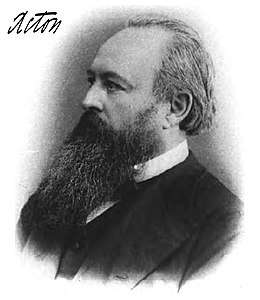
John Emerich Edward Dalberg-Acton, frontispiece, The History of Freedom and Other Essays (1907) Ed., Figgis & Laurence.
- [W]hat could never be reproduced is the general impression of Acton's many contributions to the Rambler, the Home and Foreign, and the North British Review. ...Any one who wished to understand the personality of Acton could not do better than take the published Bibliography and read a few of the articles on "contemporary literature" furnished by him to the three Reviews. In no other way could the reader so clearly realise the complexity of his mind or the vast number of subjects which he could touch with the hand of a master. ...His writing before he was thirty years of age shows an intimate and detailed knowledge of documents and authorities which with most students is the "hard won and hardly won" achievement of a lifetime of labour. ...he treats of matters which range from the dawn of history through the ancient empires down to subjects ...essentially modern ...In all these writings of Acton those qualities manifest themselves, which... gave him a distinct and unique place among his contemporaries. Here is the same austere love of truth, the same resolve to dig to the bed-rock of fact, and to exhaust all sources of possible illumination, the same breadth of view and intensity of inquiring ardour, which stimulated his studies and limited his productive power. Above all, there is the same unwavering faith in principles, as affording the only criterion of judgment amid the ever-fluctuating welter of human passions, political manœuvring, and ecclesiastical intrigue.
- We note the same value for great books as the source of wisdom, combined with the same enthusiasm for immediate justice which made Acton the despair of the mere academic student, an enigma among men of the world, and a stumbling block to the politician of the clubs. ...we find that certainty and decision of judgment, that crisp concentration of phrase, that grave and deliberate irony and that mastery of subtlety, allusion, and wit, which make his interpretation an adventure and his judgment a sword.
- The ardour of his opinions, so different from those which have usually distorted history, gives an interest even to his grossest errors.
- Perhaps... the most characteristic of these forgotten judgments is the description of Lord Liverpool and the class which supported him. Not even Disraeli, painting the leader of that party which he was destined so strangely to "educate," could equal the austere and accurate irony with which Acton, writing as a student, not as a novelist, sums up the characteristics of the class of his birth.
- The longer essays republished in these volumes exhibit... a personality which even those who disagreed with his views must allow to have been one of the most remarkable products of European culture in the nineteenth century.
- During the first period—roughly to be dated from 1855 to 1863—he was hopefully striving, under the influence of Döllinger (his teacher from the age of seventeen) to educate his co-religionists in breadth and sympathy, and to place before his countrymen ideals of right in politics, which were to him bound up with the Catholic faith. The combination of scientific inquiry with true rules of political justice he claimed, in a letter to Döllinger, as the aim of the Home and Foreign Review. ...a quarterly ...far surpassing, alike in knowledge, range, and certainty, any of the other quarterlies, political, or ecclesiastical, or specialist, which the nineteenth century produced. ...superior, while it displayed a cosmopolitan interest foreign to most English journals.
- Next came... the "fighting period," when he stood forth as the leader among laymen of the party opposed to that "insolent and aggressive faction" which achieved its imagined triumph at the Vatican Council. This period,... dated from the issue of the Syllabus by Pius IX. in 1864, may be considered to close with the reply to Mr. Gladstone's pamphlet on "The Vatican Decrees," and with the attempt of the famous Cardinal, in whose mind history was identified with heresy, to drive from the Roman communion its most illustrious English layman.
- We may date the third period of Acton's life from the failure of Manning's attempt, or indeed a little earlier. He had now given up all attempt to contend against the dominant influence of the Court of Rome, though feeling that loyalty to the Church... as a living body was independent of the disastrous policy of its hierarchy. During this time he was occupied with the great unrealised project of the history of liberty or in movements of English politics... In the earlier part of this period are... some of the best things that Acton ever wrote, such as the lectures on Liberty... It is characterised by his discovery in the "eighties" that Döllinger and he were divided on the question of the severity of condemnation to be passed on persecutors and their approvers. ...Finding that he had misunderstood his master, Acton was for a time profoundly discouraged, declared himself isolated, and surrendered the outlook of literary work as vain. He found... that in ecclesiastical as in general politics he was alone, however much he might sympathise with others up to a certain point. On the other hand, these years witnessed a gradual mellowing of his judgment in regard to the prospects of the Church, and its capacity to absorb and interpret in a harmless sense the dogma against whose promulgation he had fought so eagerly. ...the English element in Acton came out most strongly in this period, closing as it did with the Cambridge Professorship, and including the development of the friendship between himself and Mr. Gladstone.
- There were in him strains of many races. On his father's side he was an English country squire, but foreign residence and the Neapolitan Court had largely affected the family, in addition to that flavour of cosmopolitan culture which belongs to the more highly placed Englishmen of the Roman Communion. On his mother's side he was a member of one of the oldest and greatest families in Germany... The Dalbergs... had intermarried with an Italian family, the Brignoli. Trained first at Oscott under Wiseman, and afterwards at Munich under Döllinger, in whose house he lived, Acton by education as well as birth was a cosmopolitan, while his marriage with the family of Arco-Valley introduced a further strain of Bavarian influence into his life. His mother's second marriage with Lord Granville brought him into connection with the dominant influences of the great Whig Houses.
External links
- The Acton Institute for the Study of Religion & Liberty
- The Study of History (11 June 1895)
- Lectures on Modern History (1906) - PDF file at Google
- The History of Freedom and Other Essays (1907) downloadable in HTML and PDF formats
- "The Acton - Lee Correspondence" (1866)
- The History of Freedom in Antiquity (26 February 1877)
- The History of Freedom in Christianity (8 May 1877)
This article is issued from
Wikiquote.
The text is licensed under Creative
Commons - Attribution - Sharealike.
Additional terms may apply for the media files.

